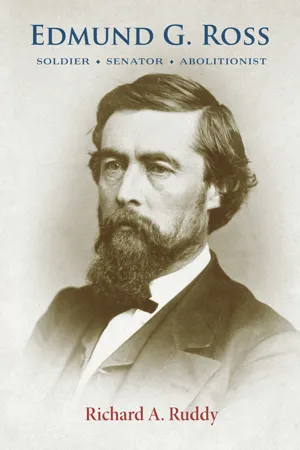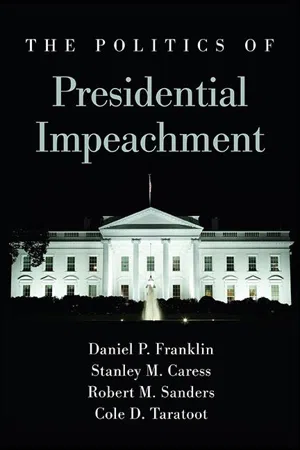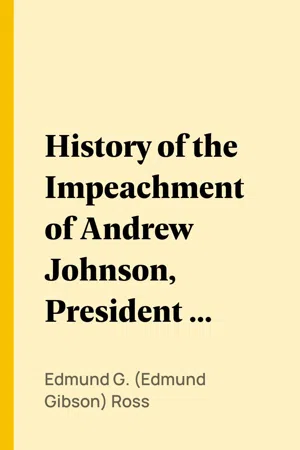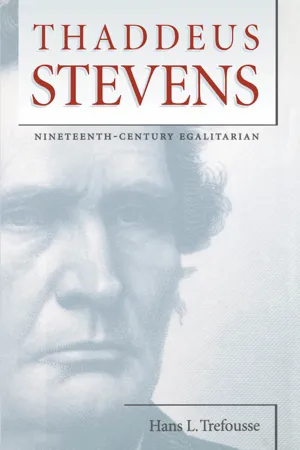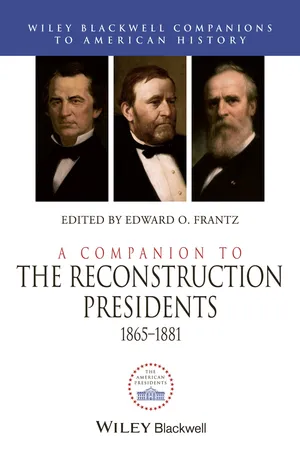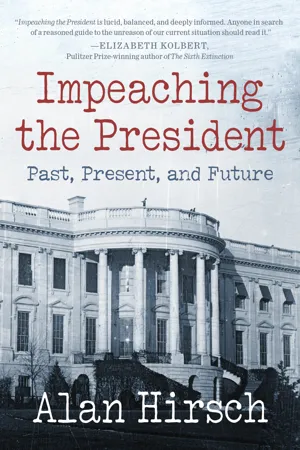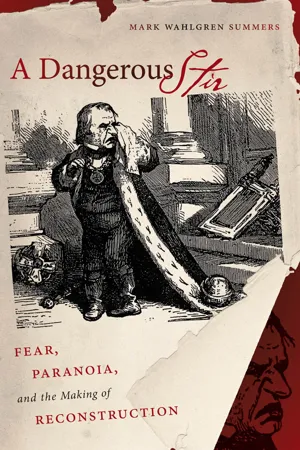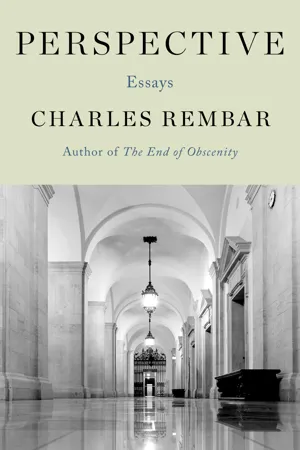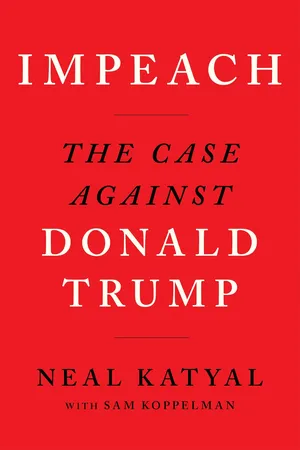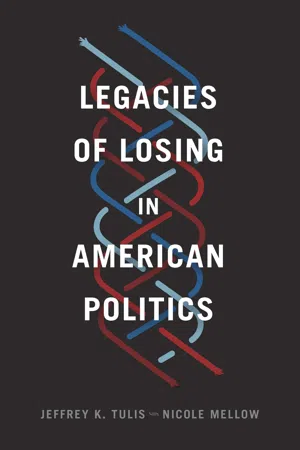History
Impeachment of Andrew Johnson
The impeachment of Andrew Johnson was a significant event in American history that took place in 1868. Johnson, the 17th President of the United States, was impeached by the House of Representatives on charges of violating the Tenure of Office Act. The Senate trial ultimately resulted in Johnson's acquittal by just one vote, making him the first president to be impeached.
Written by Perlego with AI-assistance
Related key terms
10 Key excerpts on "Impeachment of Andrew Johnson"
- eBook - ePub
Edmund G. Ross
Soldier, Senator, Abolitionist
- Richard A. Ruddy(Author)
- 2013(Publication Date)
- University of New Mexico Press(Publisher)
CHAPTER THIRTEEN
THE IMPEACHMENT TRIAL OF ANDREW JOHNSON
[I] weighed the cause as the Constitution and laws and my oath demanded. —Ross, speech to the United States Senate, May 27, 1868ALTHOUGH THE 1868 MOVE to impeach Andrew Johnson became tied to Johnson’s defiance of the Tenure of Office Act, the impeachment always was more about politics than it was about a violation of law. It was inextricably linked to the Reconstruction Acts and Johnson’s obstructionist policies.The first effort to impeach, in December 1867, had failed when the House was unable to find charges against Johnson substantial enough to warrant his removal. No president had ever been impeached, and so no precedent existed for removal from office. The House, in the 1867 effort, had by implication made “high crimes and misdemeanors” sufficient justification for impeachment. So as the impeachment trial of 1868 began, the question before the House, as prosecutor, and the Senate, as jurists, became to decide whether Andrew Johnson had violated a valid law and, if so, whether that was an impeachable offense.The 1867 Tenure of Office Act made it illegal for the president to remove any government officer appointed by the president and confirmed by the Senate unless and until the Senate confirmed a replacement. The law covered officeholders from cabinet members right down to postmasters in the smallest towns in the United States. An exception in the law allowed the president to remove an official when the Senate was in adjournment, but the Senate had the right of review upon reconvening. Clearly Johnson was in violation, or attempting to be in violation, of the Tenure of Office Act with the appointment of General Lorenzo Thomas to replace Edwin Stanton in February 1868 while the Senate was in session. In the eyes of the Radical leaders in Congress, this was all that was needed to seek the removal of Johnson. So eager were the Radicals in the House of Representatives that their vote on impeachment was taken even before they had drawn up articles. - eBook - ePub
- Daniel P. Franklin, Stanley M. Caress, Robert M. Sanders, Cole D. Taratoot(Authors)
- 2020(Publication Date)
- SUNY Press(Publisher)
347. ACCUSED OF CRIMINAL BEHAVIOR —ACTUALChapter 1 outlined the constitutional provisions that refer to actual criminal behavior as “high crimes and misdemeanors.” While the definition of what actions constitute a high crime and what actions constitute a misdemeanor is not clear, these actions can be said to have general, though not exclusive, application to actions by a president that are criminal in nature. In other words, this involves some criminal wrongdoing by the president and something that is clearly legal in nature.Andrew Johnson was never accused of committing a real crime at any time during his presidency, with the dubious exception of the Tenure of Office Act. Additionally, during his long public career he was never tarnished by any legal scandal and there was never a hint of criminal activity in his public or private life. His personal life was exemplary. He had a reputation for being trustworthy and honest. His loyalty to the United States was beyond reproach. His steadfast refusal to support the secessionist movement in Tennessee and his firm commitment to preserving the Union demonstrated his unwavering allegiance to his country.35 In fact, during the trial, his defense attorneys went to great lengths to extoll Johnson’s patriotism and to recount how he put his own life in danger during the early days of the war by staying loyal to the Union.Ironically, there was an unscrupulous conspiracy by a couple of congressmen early in his presidency to falsely implicate Johnson in the assassination of Abraham Lincoln. Johnson was also the victim of false accusations during the first attempt to impeach him when it was rumored that he blocked the confiscation of a Southern railroad for personal gain. In fact, Johnson took steps to prevent the railroad from being seized from its rightful owner who Johnson personally knew was pro-Union. Johnson acted because taking the railroad owner’s property after the war was completely unjustified. - Edmund G. (Edmund Gibson) Ross(Author)
- 2000(Publication Date)
- Perlego(Publisher)
Neither the Executive nor the judiciary had any right to interfere with it except so far as was necessary to control it by military rule until the SOVEREIGN POWER OF THE NATION had provided for its civil administration. No power but Congress had any right to say WHETHER EVER OR WHEN they should be admitted to the Union as States and entitled to the privileges of the Constitution of the United States. And yet Andrew Johnson, with unblushing hardihood, undertook to rule them by his own power alone; to lead them into full communion with the Union: direct them what governments to erect and what constitutions to adopt, and to send Representatives and Senators to Congress according to his instructions. When admonished by express act of Congress, more than once repeated, he disregarded the warning and continued his lawless usurpation. He is since known to have obstructed the re-establishment of those governments by the authority of Congress, and has advised the inhabitants to resist the legislation of Congress. In my judgment his conduct with regard to that transaction was a high-handed usurpation of power which ought long ago to have brought him to impeachment and trial and to have removed him from his position of great mischief.I trust that when we come to vote upon this question we shall remember that although it is the duty of the President to see that the laws be executed, THE SOVEREIGN POWER OF THE NATION RESTS IN CONGRESS, who have been placed around the executive as muniments to defend his rights, and as watchmen to enforce his obedience to the law and the Constitution. His oath to obey the Constitution and our duty to compel him to do it are a tremendous obligation, heavier than was ever assumed by mortal rulers. We are to protect or to destroy the liberty and happiness of a mighty people, and to take care that they progress in civilization and defend themselves against every kind of tyranny. As we deal with the first great political malefactor so will be the result of our efforts to perpetuate the happiness and good government of the human race. The God of our fathers, who inspired them with the thought of universal freedom, will hold us responsible for the noble institutions which they projected and expected us to carry out.The Clerk then read the Resolution and the House proceeded to vote, as follows: Resolution providing for the Impeachment of Andrew Johnson, President of the United States: Resolved, That Andrew Johnson, President of the United States, be impeached of high crimes and misdemeanors in office.Yeas—Messrs. Allison, Ames, Anderson, Arnell, Delos R. Ashley, James M. Ashley, Bailey, Baker, Baldwin, Banks, Beaman, Beatty, Benton, Bingham, Blaine, Blair, Boutwell, Bromwell, Broomall. Buckland, Butler, Cake, Churchill, Reader W. Clarke, Sidney Clarke, Cobb, Coburn, Cook, Cornell, Covode, Cullom, Dawes, Dodge, Driggs, Eckley, Eggleston, Eliot, Farnsworth, Ferries. Ferry, Fields, Gravely, Griswold, Halsy, Harding, Higby, Hill, Hooper, Hopkins, Asahel W. Hubbard, Chester D. Hubbard, Hulburd, Hunter, Ingersoll, Jenckes, Judd, Julian, Kelley, Kelsey, Ketcham, Kitchen Laflin, George V. Lawrence, William Lawrence, Lincoln, Loan, Logan, Loughridge, Lynch, Mallory, Marvin, McCarthy, McClurg, Mercur, Miller, Moore, Moorhead, Morrell, Mullins, Myers, Newcomb, Nunn, O'Neill, Orth, Paine, Perham, Peters, Pike, Pile, Plants, Poland, Polsley, Price, Raum, Robertson, Sawyer, Schenck, Scofield, Selye, Shanks, Smith, Spalding, Starkweather, Aaron F. Stevens, Thaddeus Stevens, Stokes, Taffe, Taylor, Trowbridge, Twitchell, Upson, Van Aernam. Burt Van Horn, Van Wyck, Ward, Cadwalader C. Washburn, Elihu B. Washburn, Williams, Washburn, Welker, Thomas Williams, James F. Wilson, John T. Wilson, Stephen F. Wilson, Windom, Woodbridge and the Speaker—126.- eBook - ePub
Civil War America
Nineteenth-Century Egalitarian
- Hans L. Trefousse(Author)
- 2000(Publication Date)
- The University of North Carolina Press(Publisher)
Calling the president’s attempted removal of Stanton on February 21 a clear misdemeanor as defined by the Tenure of Office Act, he reminded his colleagues that in 1865, disregarding the exclusive power of Congress to do so, Johnson had tried to govern the conquered states, an action for which he should have been impeached at the time. “This is not to be the temporary triumph of a political party,” he concluded, “but is to endure in its consequence until the whole continent shall be filled with a free and untrammeled people or shall be a nest of shrinking, cowardly slaves.” Although he was so weak that his voice could not be heard twenty feet away—after starting, he had to once again turn over the speech to McPherson to be read—he was still very much in charge of the proceedings. Immediately moving that two committees be set up, he proposed a committee of two to notify the Senate and a committee of seven to draw up articles of impeachment. His motions passed, and he and Bingham were appointed to both committees. 4 The next day, a cold and snowy one, was the time for the notification of the Senate. Too feeble to walk, looking pale, emaciated, and deathlike, the Commoner was carried by two young black men to the door of the Upper House, where at 1:10 he took his cane and, again leaning on Bingham’s arm, walked down the aisle to the bar, followed by members of the House. “Mr. President,” he said, addressing Senator Wade, “In obedience to the order of the House of Representatives we appear before you, and in the name of the House of Representatives and all the people of the United States, we do impeach Andrew Johnson, President of the United States, of high crimes and misdemeanors in office.” Informing the Senate that articles of impeachment would soon be exhibited and demanding that it take order for the president’s appearance, together with Bingham, he withdrew to report the action to the House - Edward O. Frantz(Author)
- 2014(Publication Date)
- Wiley-Blackwell(Publisher)
First and foremost, the Republican Party was hardly a monolithic group, and a super-majority of the Senate must still vote to impeach the president. Though the Republican Party had a super-majority in the Senate, the impeachment would test party discipline. President Johnson did not make this challenge any easier by securing the best counsel possible. His defense team included Benjamin Curtis, former Supreme Court justice and dissenter in Dred Scott ; William Evarts, a leading member of the New York bar and future Secretary of State; and Attorney General Henry Stanberry, who resigned from Johnson’s cabinet in order to join the defense. The Constitution offered a third complication. Whereas an impeachment of any federal official would be presided by the Senate as a judicial body, the trial of the president must be presided by the Chief Justice. Unfortunately for the Republicans, Chief Justice Salmon Chase would not make things any easier for their side. An ambitious man with obvious presidential aspirations, Chase was a political enemy of Benjamin Wade, the president pro tem of the Senate and thus the man who would assume the presidency upon Johnson’s conviction. His rulings throughout the trial suggest that his political ambition might have shrouded his impartiality (Benedict, 1973). On March 4, 1868 the House managers came to the Senate. Thus began the impeachment trial of President Johnson. It was an open question whether the trial would turn into a partisan event (this is the view of, among others, DeWitt, 1903, and Lomask, 1960), or whether it would be a legal case (for this view, see Benedict, 1973). The first task for the Chief Justice appeared simple enough: to administer to each senator the oath required by the Constitution. But a difficulty immediately surfaced as Senator Wade rose to take his oath- eBook - ePub
Impeaching the President
Past, Present, and Future
- Alan Hirsch(Author)
- 2018(Publication Date)
- City Lights Publishers(Publisher)
On March 5, 1868, the Senate commenced the first presidential impeachment trial in U.S. history. Indeed, there had been just a handful of prior impeachments of any federal officials, and only a single conviction. That case merits an asterisk in the historical record: Judge West Humphreys, impeached and convicted for joining the Confederacy, had long abandoned his post and did not appear at his trial or contest his prosecution. Humphreys was tried in absentia and found guilty after a trial that lasted a single afternoon.The chief justice presiding over the trial of Andrew Johnson was Salmon P. Chase, which illustrates that foresight by the drafters of the Constitution could do only so much to ward off problems. They provided that the chief justice would preside over a president’s impeachment trial in order to avoid the vice president’s conflict of interest. But Chase was a presidential wannabe who had sought the office in 1860. President Lincoln selected him as secretary of the treasury (and later appointed him to the Court) as part of his “team of rivals,” but kept a careful eye on his ambitious underling. Lincoln correctly surmised that Chase would never relinquish his desire to be president. Even as he presided over Andrew Johnson’s impeachment trial, Chase was angling for the Democratic presidential nomination—surely an easier task if the incumbent president was removed. So much for avoiding conflict of interest.The Senate as a court of impeachment for the trial of President Andrew Johnson. Sketched in 1868 by Theodore R. Davis.Yet one cannot assume that Chase wished to see Johnson convicted, and some perceived otherwise. On March 4, the eve of the trial, Chase hosted a reception at his home and Johnson made an appearance. Newspaper reports of his attendance rankled anti-Johnson partisans.Chase was hardly the only participant in Johnson’s trial whose impartiality was questioned. The senators to try the case included Chase’s son-in-law, William Sprague (from Rhode Island), and Johnson’s son-in-law, David Patterson (Tennessee). While few registered complaints about their involvement, the participation of Ohio’s Benjamin Wade, the president pro tempore of the Senate, became a major source of contention. - eBook - ePub
Civil War America
Fear, Paranoia, and the Making of Reconstruction
- Mark Wahlgren Summers(Author)
- 2012(Publication Date)
- The University of North Carolina Press(Publisher)
The power had been used against federal judges in the past. But impeaching a president was something new, and historians may have missed the vast amount of doubt as to how it would work, not to mention the rich supply of constitutional misinformation that editors could draw on to enlighten their readers. What, precisely, were the “high crimes and misdemeanors” that opened a president to impeachment? Could he be removed for walking on the grass or for misgovernment? Would he be compelled to attend every day’s sessions, like a prisoner in the dock? While the trial went on, did he forfeit his executive authority, and could Congress suspend him from his functions? And if so, could it do so by a simple majority vote? If convicted, did removal constitute the only punishment that the Senate could inflict, or could a joint resolution disfranchise him or open him to indictment and imprisonment? Only the full Senate could try him; but suppose one-third of the states were excluded: did it constitute a court? And could the president challenge its authority to put him on trial? 10 None of these questions had been put to the test, and on all there were different possible answers, some of them quite sinister in their implications. 11 If the president imagined an unscrupulous opposition, the course of the impeachment investigation only confirmed his suspicions. Even as the House Judiciary Committee examined Johnson’s actions for a usurpation of powers charge, other congressmen were on the track of more sensational possibilities. With so many members uneasy about proceeding, having the most cautious, judicious, and experienced directors was vital to success: somebody like “Judge” Luke Poland of Vermont, say, glacially austere and proper down to the last brass button on his small-coat, or Judiciary Committee chairman James F. Wilson, who ended up chairing the formal inquiry. But the real headlines went to two fiery spirits. The more respectable of the two, James R - eBook - ePub
- Charles Rembar(Author)
- 2015(Publication Date)
- Open Road Media(Publisher)
This is error. Impeachment is no closer to a criminal trial than it is to an election. It is not an election, of course, despite the fact that Vice-President Ford, when he was a Congressman (either cynically, he being a proponent of impeachment at the time, or, more likely, thoughtlessly) declared that an impeachable offence is whatever Congress says it is. The definition of impeachable transgressions is not the subject of this piece, which deals, rather, with the standards according to which Congress should arrive at its decision on whether such transgressions have occurred. But procedure here, as nearly everywhere, is hardly less significant than substance.Impeachment is a unique political mechanism created by our Constitution, a proceeding sui generis. It therefore ought to have its own procedural standards, appropriate to its constitutional purpose. Models and forms taken from other parts of our governmental system have a limited utility. It is a mistake to import wholesale into the Constitution’s provisions for expulsion from federal office—provisions that vest responsibility for the matter in the legislative branch—concepts peculiar to the functioning of the judiciary.The confusion is natural. There are several reasons for it, all related. One is that impeachment of a President is virtually unprecedented. The House has voted Articles of Impeachment only twelve times in our history, and only four times has impeachment resulted in removal. Only once has a President been involved, and, though the Senate vote was notoriously close, the charges against Andrew Johnson were ludicrous. He was accused of two “high crimes and misdemeanors.” One was making speeches disrespectful of the Congress. The other was firing his Secretary of War, in violation of a statute designed by Congress to provoke a confrontation, a statute obviously unconstitutional.The charges against President Nixon provide a shocking contrast. Whether or not they are true, and whether or not they will lead to an impeachment, we have been forced to think about the gravest accusations, short of treason, that can be lodged against a Chief Executive: obstruction of justice, bribery, deliberate failure to check excesses of his principal subordinates, violation of his Constitutional duty to “take care that the laws be faithfully executed,” secret abuse of Executive power—in short, subversion of the Constitution. No matter how inured we may be to political immorality, all this—if true—is of a different order, and creates a sense of crisis. We naturally turn to precedents in a crisis; the past has banked its wisdom and it is foolish not to draw on it. But since there are no precedents actually in point, we make the error of reaching for precedents not in point. And since the abuses charged, whatever they technically may be, are crimes in that larger sense of the word we often use, we tend to look for guidance to the criminal law. - eBook - ePub
Impeach
The Case Against Donald Trump
- Neal Katyal, Sam Koppelman(Authors)
- 2019(Publication Date)
- Canongate Books(Publisher)
And yet, Congress declined to impeach Burr, because they didn’t believe his actions interfered with his ability to do his job. Of course he’d committed a crime. Murder always has been, and always will be, illegal. But in his case, they didn’t believe it was a high crime. Which raises the question: What does the word “high” mean in this context? Contrary to popular belief, the word “high” as used in the Constitution doesn’t have anything to do with “the severity of the crime,” as Jon Meacham, Timothy Naftali, Peter Baker, and Jeffrey Engel explain in their book, Impeachment: An American History. The term “high crimes,” as the founders knew it, came from English law, where, to quote Meacham, it was defined as offenses “committed against the crown in a monarchy or the people in a democracy.” This is probably why the grammarians on the Committee on Style deleted the phrase “against the United States,” because they felt it was redundant with the word “high.” Little did they know: “high” would take on many different meanings in the years ahead, and the debate over what exactly qualifies as a “high crime” would incessantly divide Congress over the course of American history, never more so than during the impeachment inquiries of President Andrew Johnson, President Bill Clinton, and President Richard Nixon, as well as the (abandoned) impeachment inquiry of President John Tyler. THE IMPEACHMENT OF PRESIDENT JOHNSON The moment Andrew Johnson swore his oath of office after Abraham Lincoln’s death, one of America’s greatest presidents was replaced with one of its worst. Where Lincoln was thoughtful, brilliant, and effective, Johnson was irascible, ignorant, and incompetent. While Lincoln spent his presidency uniting a house divided, Johnson spent his tearing America apart - eBook - ePub
- Jeffrey K. Tulis, Nicole Mellow(Authors)
- 2018(Publication Date)
- University of Chicago Press(Publisher)
3Reconstruction
Andrew Johnson’s Politics of Obstruction
Andrew Johnson is generally regarded as one of the worst presidents in American political history. It would be hard to think of a clearer example of failed leadership. His vision and his specific plans for bringing the South back into the Union were rejected by Congress. He aggressively opposed the major post–Civil War Reconstruction agenda, which was legislated by Northerners in Congress over his vetoes. Amendments to the Constitution that he opposed were passed by Congress and ratified by a northern national majority. The victorious opposition against him included leaders of Johnson’s own governing coalition, and they grew to detest him. Johnson’s extraordinary string of political defeats culminated in his impeachment, the first of a president. He escaped conviction by the narrowest of margins and left office politically defeated and disgraced.Yet it was Andrew Johnson’s vision, not that of Reconstruction lawmakers, that reconstituted American politics. Despite the significance of the “second American founding,” policies similar to those Johnson had advanced as president quickly replaced those that constituted the Reconstruction agenda, evidencing such a powerful hold on the polity that they made a mockery of the amended Constitution. Johnson’s vision was woven into the very fabric of American political life for a century, in ways that we still contend with today. Less than a handful of presidents have been as successful as Andrew Johnson in advancing their political project.1That Andrew Johnson failed to legislate his vision while in office and that American political development subsequently came to be characterized by policies close to those he preferred are facts that would be difficult to contest. Indeed, while Anti-Federal success in influencing constitutional interpretation is not very well appreciated, the failure to adhere to post–Civil War Reconstruction amendments in any meaningful fashion is well known. It is therefore surprising that major studies of American politics that conjoin Andrew Johnson’s legislative defeats and eventual policy success are so difficult to find. Perhaps this reflects social science’s discomfort with the ironic. Our central argument, however, goes beyond reflection on the ironic conjunction. We claim that these two facts are connected historically, that Andrew Johnson’s political failure as a president was itself the instrument for the later success of his policies.
Index pages curate the most relevant extracts from our library of academic textbooks. They’ve been created using an in-house natural language model (NLM), each adding context and meaning to key research topics.
